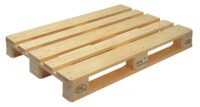 The largest global pallet pool, EPAL, released figures recently showing that UK production of EPAL pallets continued to rise during 2009 by 14%. These figures follow an increase of 22% during 2008, bringing BREPAL’s annual production to 1.3 million pallets within the UK and Ireland. Whilst this remains a small percentage of the 70 million pallets that EPAL produce annually worldwide, or the 500 million EPAL pallets in current circulation, it shows a growing trend towards supporting local manufacture.
The largest global pallet pool, EPAL, released figures recently showing that UK production of EPAL pallets continued to rise during 2009 by 14%. These figures follow an increase of 22% during 2008, bringing BREPAL’s annual production to 1.3 million pallets within the UK and Ireland. Whilst this remains a small percentage of the 70 million pallets that EPAL produce annually worldwide, or the 500 million EPAL pallets in current circulation, it shows a growing trend towards supporting local manufacture.
Paul Davidson, CEO of BREPAL suggests ‘There are several reasons why UK produced EPAL pallets have become increasingly popular. In the current economic climate, customers need to know that they have pallet solutions that they can reply upon, in terms of quality, price and impact on the environment’.
Gil Covey from Unit Pallets agrees ‘The big advantage for EPAL customers is that they can have confidence that the strict quality control standards insisted on by EPAL have been properly enforced. Every approved partner undergoes regular un-announced spot checks by the independent verification company SGS, so that every EPAL pallet is guaranteed to be fit for purpose. In today’s market where health and safety concerns and insurance criteria are tightening up – this is becoming increasingly important.’
The design and quality control of approved EPAL pallets meat that they can be twice as robust as non-approved pallets, which is reflected in their relatively high resale value. The online partner database for EPAL users across Europe to arrange collection and redistribution continues to improve exchangeability of pallets within Europe – making EPAL a very cost effective solution, with research indicating long term savings of up to 25%.
However, in today’s market, it is not just the financial cost of a pallet that is being taken into account. The environmental costs are becoming increasing important to customers. Locally produced EPAL pallets can help assessment of the environmental costs in three ways:- reduced transportation costs, traceability and carbon footprinting.
As well as the obvious benefit of lower transportation costs, local production helps to ensure more reliable chain of custody traceability options. For instance, during 2009 all UK produced EPAL pallets were made from wood that can be traced to UK FSC approved forests allowing customers to ensure their sustainability credentials.
The negative carbon footprint of the wood itself compared to plastic and other materials helps offset other elements of the distribution process. An EPAL Euro pallet carries a negative carbon footprint of – in contrast to the +70kgCO2/pallet of an average plastic pallet (source ECCM Feb 2008).
Paul Davidson continues ‘Early indications suggest that EPAL is continuing to enjoy the same growth trend during 2010’.
For more information about EPAL, call Paul Davidson on 01223 479594, email davidsonpaulj@googlemail.com or visit www.brepal.org.uk




Comments are closed.